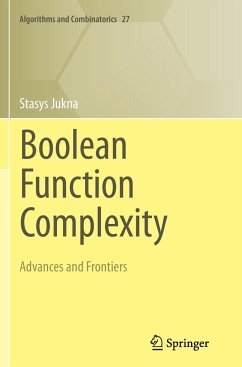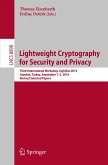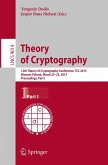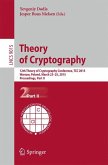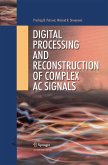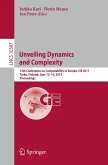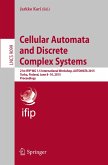Boolean circuit complexity is the combinatorics of computer science and involves many intriguing problems that are easy to state and explain, even for the layman. This book is a comprehensive description of basic lower bound arguments, covering many of the gems of this "complexity Waterloo" that have been discovered over the past several decades, right up to results from the last year or two. Many open problems, marked as Research Problems, are mentioned along the way. The problems are mainly of combinatorial flavor but their solutions could have great consequences in circuit complexity and computer science. The book will be of interest to graduate students and researchers in the fields of computer science and discrete mathematics.
"All material in the book is accessible to graduate or even undergraduate students of computer science, mathematics or electrical engineering. ... I gladly recommend this book to beginning students, who will find this book a good starting point in exploring the field of complexity theory, as well as to mature researchers who would like to bring themselves up-to-date on some aspect of the theory. ... the book contains a large number of open research problems, including some really enticing ones!" (Sergey Yekhanin, SIAM Review, Vol. 57 (3), September, 2015)
"The results stated in the book are well motivated and given with an intuitive explanationof their proof idea wherever appropriate. ... Each chapter of the book contains open research problems and a section with exercises to deepen the understanding of the presented material and make the book suitable for course work. The book is well suited for graduate students and professionals who seek an accessible, research-oriented guide to the important techniques for proving lower bounds on the complexity of problems connected to Boolean functions." (Michael Thomas, Mathematical Reviews, January, 2013)
"Jukna, a well-known researcher in the field, has succeeded in producing an excellent comprehensive exposition on the field, starting from early results from the '40s and '50s and proceeding to the most recent achievements. ... The book is going to be very useful for researchers and graduate students in computer science and discrete mathematics. ... The style of writing is pleasant ... . The many exercises and research problems round out the highlights of this recommendable book." (Arto Salomaa, ACM Computing Reviews, June, 2012)
"This monograph is about circuit complexity, dealing with establishing lower bounds on the computational complexity of specific problems ... . The book is mainly devoted to mathematicians, to researchers in computer science wishing to complete their knowledge about the state of the art in circuit complexity, as well as to graduate students in mathematics and computer science, and is self-contained. ... An impressive work providing a large amount of information on circuit complexity." (Ioan Tomescu, Zentralblatt MATH, Vol. 1235, 2012)
"The results stated in the book are well motivated and given with an intuitive explanationof their proof idea wherever appropriate. ... Each chapter of the book contains open research problems and a section with exercises to deepen the understanding of the presented material and make the book suitable for course work. The book is well suited for graduate students and professionals who seek an accessible, research-oriented guide to the important techniques for proving lower bounds on the complexity of problems connected to Boolean functions." (Michael Thomas, Mathematical Reviews, January, 2013)
"Jukna, a well-known researcher in the field, has succeeded in producing an excellent comprehensive exposition on the field, starting from early results from the '40s and '50s and proceeding to the most recent achievements. ... The book is going to be very useful for researchers and graduate students in computer science and discrete mathematics. ... The style of writing is pleasant ... . The many exercises and research problems round out the highlights of this recommendable book." (Arto Salomaa, ACM Computing Reviews, June, 2012)
"This monograph is about circuit complexity, dealing with establishing lower bounds on the computational complexity of specific problems ... . The book is mainly devoted to mathematicians, to researchers in computer science wishing to complete their knowledge about the state of the art in circuit complexity, as well as to graduate students in mathematics and computer science, and is self-contained. ... An impressive work providing a large amount of information on circuit complexity." (Ioan Tomescu, Zentralblatt MATH, Vol. 1235, 2012)
From the reviews: "This monograph is about circuit complexity, dealing with establishing lower bounds on the computational complexity of specific problems ... . The book is mainly devoted to mathematicians, to researchers in computer science wishing to complete their knowledge about the state of the art in circuit complexity, as well as to graduate students in mathematics and computer science, and is self-contained. ... An impressive work providing a large amount of information on circuit complexity." (Ioan Tomescu, Zentralblatt MATH, Vol. 1235, 2012) "Jukna, a well-known researcher in the field, has succeeded in producing an excellent comprehensive exposition on the field, starting from early results from the '40s and '50s and proceeding to the most recent achievements. ... The book is going to be very useful for researchers and graduate students in computer science and discrete mathematics. ... The style of writing is pleasant ... . The many exercises and research problems round out the highlights of this recommendable book." (Arto Salomaa, ACM Computing Reviews, June, 2012) "The results stated in the book are well motivated and given with an intuitive explanation of their proof idea wherever appropriate. ... Each chapter of the book contains open research problems and a section with exercises to deepen the understanding of the presented material and make the book suitable for course work. The book is well suited for graduate students and professionals who seek an accessible, research-oriented guide to the important techniques for proving lower bounds on the complexity of problems connected to Boolean functions." (Michael Thomas, Mathematical Reviews, January, 2013)

